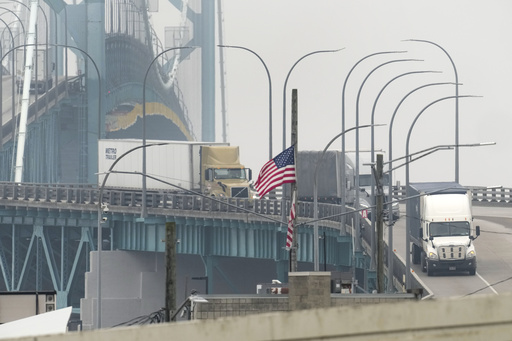TORONTO — As Canadians come to terms with U.S. President Donald Trump’s escalating trade tensions and remarks suggesting Canada could become the 51st state, it is clear that a long-standing and strong alliance is now strained. This relationship, grounded in geographical proximity, shared heritage, and common interests, appears to be facing a significant rupture.
A prevailing sentiment of betrayal is sweeping through Canada following Trump’s aggressive stance towards the nation. His threats of implementing substantial tariffs, specifically 25%, on Canadian goods have prompted concern among Canadians regarding their sovereignty. In response, Prime Minister Justin Trudeau announced that these tariffs would be delayed for a month, offering a chance for enhanced cooperation at the border.
Current discourse in Canada is rife with disdain for the U.S. administration’s approach. Canadian hockey fans have been expressing their discontent by booing the American national anthem at recent NHL games. In a national address, Trudeau articulated the feelings of many Canadians, referencing the sacrifices made by Canadian forces alongside Americans in conflicts like Afghanistan and during natural disasters such as Hurricane Katrina. “We were always there standing with you, grieving with you, the American people,” he emphasized.
Concerns regarding long-lasting repercussions from this trade conflict are voiced by experts. Robert Bothwell, a historian and professor at the University of Toronto, expressed that the current crisis could diminish trust in the U.S. for years to come. He remarked on the absurdity of suggesting Canada is the source of problems, arguing that such talks demonstrate a fundamentally disrespectful attitude towards Canada’s sovereignty.
The strong economic interdependence between Canada and the United States is unparalleled, with about CAD 3.6 billion (USD 2.5 billion) worth of goods and services exchanged across the border daily. Approximately 77% of Canadian exports are directed to the U.S., making Canada the top export market for 36 U.S. states. The frequent trans-border movement, involving around 400,000 individuals daily, highlights the close ties that exist in defense, law enforcement, and cultural exchange.
Doug Ford, Ontario’s Premier, characterized the situation as a betrayal from a family member, considering the relationship one of kinship. “I’ve yet to hear one American citizen say Canada is the problem,” he noted.
In light of these developments, some Canadians are discovering alternatives to American products and altering their travel plans to the U.S. According to the U.S. Travel Association, the anticipated tariffs could adversely affect Canadian tourism and spending in the U.S., with Canadians accounting for over 20 million visits in the previous year.
Political analysts like Daniel Beland from McGill University warn that the political environment could deform perceptions in Canada towards the U.S., undermining trust that may be arduous to rebuild. He describes this as one of the most severe downturns in Canada-U.S. relations, emphasizing Trump’s indifference to Canadian autonomy.
In retaliation, Canadian officials announced the imposition of 25% tariffs on a host of American imports, including beverages and paper products, with a second, more extensive phase planned. Trudeau has maintained a hope that discussions may lead to a diplomatic resolution without punitive measures against Canada.
The dialogue surrounding tariffs continues. Trump has also indicated plans to impose a 10% levy on Canadian energy imports, even as Canada is a major oil supplier to the U.S., providing over 4.3 million barrels per day.
Despite ongoing tensions, Trump has asserted that Canada is unnecessary to the U.S., reiterating his earlier comments about making Canada a state. This sentiment is echoed by U.S. Vice President JD Vance, who downplayed the friendship between the two nations, questioning Canada’s military spending and drug control efforts.
Although there has been a momentary suspension of tariff threats, many Canadians remain skeptical. Bruce Arthur, a columnist for the Toronto Star, articulated that a brief pause on tariffs in exchange for superficial border discussions does little to alleviate economic anxieties.
While past grievances have occasionally marred the Canada-U.S. partnership—through trade disputes over lumber to political rifts during the Vietnam War—Trump’s rhetoric appears to mark a uniquely tumultuous chapter. His accusations that Canada would be rendered unviable without U.S. subsidies and entreaties for Canada’s annexation have ruffled feathers significantly.
Exemplifying the growing discord, at a recent NBA game in Toronto, one fan chose to sit in protest during the American anthem while donning a Canadian hat. Joseph Chua, an importer, shared his frustrations regarding the looming tariffs. “I’ve always stood during both anthems. But today we’re feeling a little bitter about things,” he admitted, reflecting the pervasive disappointment felt by many in Canada today.




